Two types of microscopes - Study guides, Class notes & Summaries
Looking for the best study guides, study notes and summaries about Two types of microscopes? On this page you'll find 314 study documents about Two types of microscopes.
All 314 results
Sort by
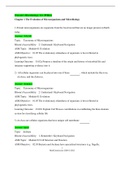
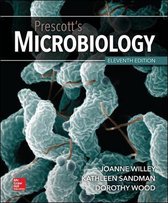
-
Test Bank For Prescotts Microbiology 11th Edition By Willey Chapter 1-43 |Complete Guide A+
- Exam (elaborations) • 1422 pages • 2023
-
- $17.99
- 5x sold
- + learn more
Prescott's Microbiology, 11e (Willey) Chapter 1 The Evolution of Microorganisms and Microbiology 1) Extant microorganisms are organisms from the fossil record that are no longer present on Earth today. Answer: FALSE Topic: Taxonomy of Microorganisms Bloom's/Accessibility: 2. Understand / Keyboard Navigation ASM Topic: Module 01 Evolution ASM Objective: 01.05 The evolutionary relatedness of organisms is best reflected in phylogenetic trees. Learning Outcome: 01.02a Propose a timeline of the ori...
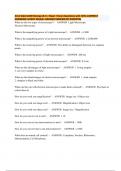
-
All of AQA GCSE Biology (9-1) - Paper 1 Exam Questions with 100% CORRECT ANSWERS LATEST 2024(A+ GRADED VERIFIED BY EXPERTS)
- Exam (elaborations) • 24 pages • 2024
- Available in package deal
-
- $17.99
- + learn more
What are the two types of microscopes? - ANSWER Light Microscope Electron Microscope What is the magnifying power of a light microscope? - ANSWER x 2,000 What is the magnifying power of an electron microscope? - ANSWER x 2,000,000
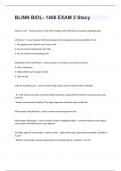
-
BLINN BIOL- 1406 EXAM 2 Stacy fully solved graded A+
- Exam (elaborations) • 23 pages • 2024
- Available in package deal
-
- $17.99
- + learn more
BLINN BIOL- 1406 EXAM 2 Stacy fully solved graded A+what is a cell? - correct answer A cell is the smallest unit of life that can function independently. cell theory? - correct answer Cell theory explains the prevalence and commonalities of cell 1. all organisms are made of one or more cells 2. the cell is the fundamental unit of life 3. all cells come from preexisting cells Implications of the cell theory - correct answer 1. Functions of all cells are similar. 2. Life is continuous. ...
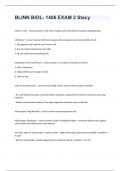
-
BLINN BIOL- 1406 EXAM 2 questions correctly answered
- Exam (elaborations) • 23 pages • 2024
-
Available in package deal
-
- $17.99
- + learn more
BLINN BIOL- 1406 EXAM 2 what is a cell? - correct answer A cell is the smallest unit of life that can function independently. cell theory? - correct answer Cell theory explains the prevalence and commonalities of cell 1. all organisms are made of one or more cells 2. the cell is the fundamental unit of life 3. all cells come from preexisting cells Implications of the cell theory - correct answer 1. Functions of all cells are similar. 2. Life is continuous. 3. Origin of life was the or...

-
Bio principles Exam 2 – Brooks Latest Update Graded A+
- Exam (elaborations) • 63 pages • 2024
-
- $12.99
- + learn more
Cytology the study of cells Robert Hooke - observed cork could float - discovered a honeycomb-like structure in a cork slice using a primitive compound microscope - only saw cell walls as this was dead tissue - coined the term "cell" for these individual compartments he saw Two types of microscopes: 1. Light Microscope 2. Electron Microscope Light Microscope - light is focused on specimen by a glass condenser lens - the image is magnified by an objective lens and an ocular lens - proj...

-
Stern's Introductory Plant Biology 14th Edition James Bidlack - Test Bank
- Exam (elaborations) • 479 pages • 2023
-
- $24.06
- 1x sold
- + learn more
Stern's Introductory Plant Biology, 14e (Bidlack) Chapter 1 What Is Plant Biology? 1) The early scientist who first demonstrated experimentally that plants do not have the same modes of nutrition as animals was A) Nehemiah Grew. B) Carl Willdenow. C) Alexander von Humboldt. D) Sir J. D. Hooker. E) J. B. van Helmont. Answer: E Topic: Diversification of Plant Study Bloom's: 1. Remember Learning Outcome: 01.04 List the aspects of botany with which each of the major botanical disciplines ...

-
Bio principles Exam 2 – Brooks Latest Update Graded A+
- Exam (elaborations) • 63 pages • 2024
- Available in package deal
-
- $11.99
- + learn more
Bio principles Exam 2 – Brooks Latest Update Graded A+ Cytology the study of cells Robert Hooke - observed cork could float - discovered a honeycomb-like structure in a cork slice using a primitive compound microscope - only saw cell walls as this was dead tissue - coined the term "cell" for these individual compartments he saw Two types of microscopes: 1. Light Microscope 2. Electron Microscope Light Microscope - light is focused on specimen by a glass condenser lens -...
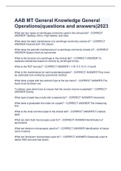
-
AAB MT General Knowledge General Operations(questions and answers)2023
- Exam (elaborations) • 3 pages • 2023
-
Available in package deal
-
- $7.49
- 1x sold
- + learn more
AAB MT General Knowledge General Operations(questions and answers)2023 What are four types of centrifuges commonly used in the clinical lab? - CORRECT ANSWER-Tabletop, Micro, High-Speed, and Ultra. What does the daily maintenance of a centrifuge commonly consist of? - CORRECT ANSWER-Cleaned with 10% bleach What does the periodic maintenance of a centrifuge commonly consist of? - CORRECT ANSWER-Speed check by tachometer What is the function of a centrifuge in the clinical lab? - CORRE...
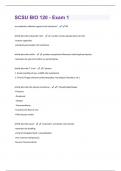
-
SCSU BIO 120 - Exam 1 Questions And Answers Rated A+
- Exam (elaborations) • 24 pages • 2024
- Available in package deal
-
- $7.99
- + learn more
are antibiotics effective against viral infections? - NO briefly describe eukaryotic cells - -contain nucleus (prokaryotes do not) -contain organelles -selectively permeable cell membrane briefly describe molds - -produce cytoplasmic filaments called hyphae/mycelia -reproduce by spore formation on aerial hyphae briefly describe T. Cruzi - 2 phases: 1. Acute (swelling of eye, cold/flu-like symptoms) 2. Chronic Chagas disease (cardiomyopathy, neurological disorders, etc.) briefly describe...
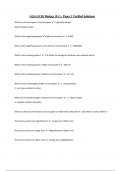
-
AQA GCSE Biology (9-1) - Paper 1 Verified Solutions
- Exam (elaborations) • 31 pages • 2024
-
Available in package deal
-
- $9.99
- + learn more
AQA GCSE Biology (9-1) - Paper 1 Verified Solutions What are the two types of microscopes? ️Light Microscope Electron Microscope What is the magnifying power of a light microscope? ️x 2,000 What is the magnifying power of an electron microscope? ️x 2,000,000 What is the resolving power? ️The ability to distinguish between two separate points What is the resolving power of light microscopes? ️200 nm What is the resolving power of electron microscopes? ️0.2 nm What are ...

Study stress? For sellers on Stuvia, these are actually golden times. KA-CHING! Earn from your study resources too and start uploading now. Discover all about earning on Stuvia


